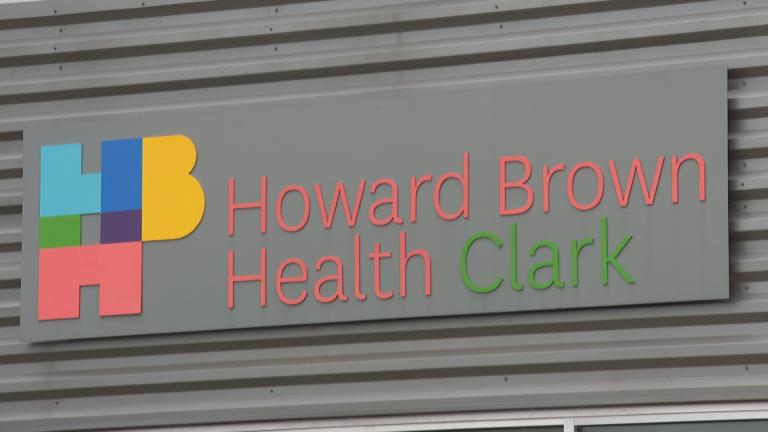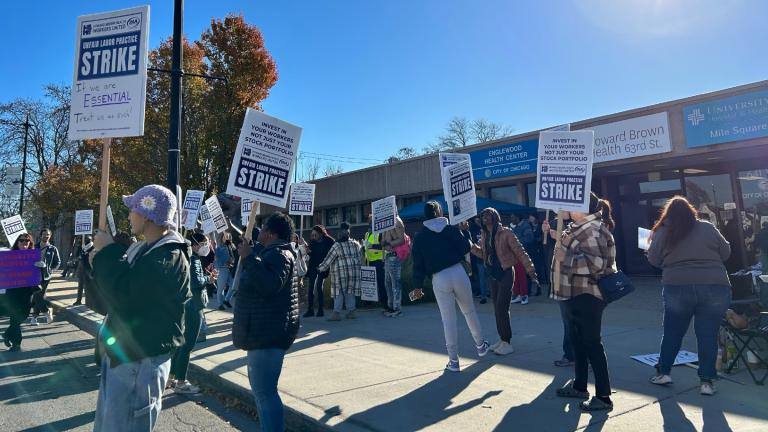Employees at Howard Brown Health on Wednesday striked for the second day over layoffs they say will create headaches for patients, and unfairly target their newly-unionized workforce instead of using other approaches to make up a budget shortfall.
Howard Brown Health will next year mark 50 years of serving the health needs of the LBGTQ and HIV-positive communities.
As a federally qualified health center, it gets government money to support its mission, including providing care to those who are uninsured or underinsured.
Going forward, it will do so minus about 16% of its workforce. According to a Jan. 2 news release, 64 out of about 720 employees just got laid off, another 15 accepted buyouts and 38 vacant positions won’t be filled.
Howard Brown’s CEO David Ernseto Munar said the reductions are needed to prevent the fiscal year from ending $12 million in the red.
“We have to turn this around. We’re losing a million dollars a month. A million dollars a month,” Munar said. “That is not a sustainable way to support a health system and if we cannot turn this around it puts in jeopardy the care of tens of thousands of patients, but also the security of the workforce needed to deliver affirming care.”
Munar said Howard Brown had relied on COVID relief money the past few years, but that money’s all used.
He said the bulk of shortfall stems from expensive changes to the 340B federal program in which pharmaceutical companies sell to federally-qualified health centers drugs at a discount.
Howard Brown provides drugs at no cost to those without insurance. Munar said while access improved when a popular AIDS drug went generic, it resulted in a revenue hit to Howard Brown.
He said the organization did its best to prevent patient-facing cuts.
“We’ve frozen spending — discretionary spending, on things like meals, travel, conferences. We’ve stopped advertising. And we’re also looking at our line items for computer equipment as well as software licenses,” Manur said. “Really trying to make sure we take every opportunity to safeguard patient care.”
The cost-cutting plan calls for executive pay cuts. Manur did not give specifics, but said collectively he and his team will be paid $100,000 less.
According to the last available 990 tax form, Munar is Howard Brown’s highest paid employee, making nearly $330,000 for the fiscal year that ended in June 2021.
Striking employees and their supporters said Munar is greedy, and believe the financial situation isn’t really that dire.
“They are in pretty good financial shape and have significant assets and investments, many of which are highly liquid. So I believe there is definitely an element of union retaliation given specifically the timing,” said Illinois Nurses Association Director Julia Bartmes.
She believes the layoffs are retaliation because non-nurse employees who are impacted just unionized athis summer and still are negotiating a first contract.
“[The layoffs will cause] harm to [employees], harm to the patients absolutely, and it is harm to the community as a whole. They are abandoning this community,” Bartmes said.
Bartmes called it a tragedy the layoffs came right after the holidays, and said already, patients have a hard time getting appointments and this will make it worse.
The nurses’ association has filed a grievance with the National Labor Relations Board, essentially arguing Howard Brown did not bargain in good faith.
Bartmes is confident the NLRB will rule in the union’s favor.
Among those laid off are bilingual health educators, like Isabel Ruiz, who said until she was laid off she did the important work of helping Spanish-speaking patients navigate language barriers with their doctors.
“Providers rely on us to do our services. To make them (patients) feel more welcome, more secure more safe, just comfortable … make them feel safe during the visit,” Ruiz said.
Many of the layoffs targeted those who work in behavioral health and social services.
Munar said he agrees with employees that needs in those areas for the LBGTQ community are great.
He said Howard Brown had about 35 programs with small teams of four to five members, but he said that model is not financially sustainable.
“We do believe that our patients, when they access care at one of our 11 clinics, they will have access to behavioral health and social services. In some cases that will be a generalist that’s been trained on things like interventions for people who’ve experienced sexual harm or violence, or have other needs that affect their access to medical services,” he said. “So we’ll be able to continue to deliver those services, but we have to deliver them in a different way.”
One laid off employee says the change will literally kill people.
Mera Flores was, until she got a layoff notice Dec. 30, a consultant for the In Power program that helps sexual assault and domestic abuse survivors navigate court dates, getting orders of protection and fleeing their abusers.
Flores said now there’s only one In Power employee remaining.
Flores said survivors often don’t feel safe going to mainstream programs mostly geared toward cisgender women, and that after one of the worst situations of their lives, survivors need affirming care like that provided at Howard Brown.
“If someone’s trying to flee and abuse situation and say they’re a queer couple, maybe they’re a polyamorous couple – just something that’s not what society sees as normal, they won’t have somewhere to go to feel safe. And essentially what can happen is dangerous; their lives are at risk. They’re already at risk, and now without the support they’re even more at risk,” Flores said. “We’re the only queer program in the entire city of Chicago that caters to queer community sexual assault and domestic abuse survivors.”
As a queer Latina, Flores doesn’t want another job. Flores wants to work at Howard Brown, and is worried about what will happen to clients with court dates next week.
Manur said with union and non-union employees alike still on the job, Howard Brown has been able to keep all of their clinics open this week despite the protests, though the system saw a 30% reduction of what it normally does the first operating day of a calendar year.
Follow Amanda Vinicky on Twitter: @AmandaVinicky




